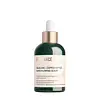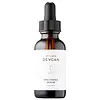What's inside
What's inside
 Key Ingredients
Key Ingredients

 Benefits
Benefits

 Ingredients Side-by-side
Ingredients Side-by-side

Water
Skin ConditioningGlycerin
HumectantPropanediol
SolventSqualane
EmollientSodium Hyaluronate
HumectantHydroxyethyl Acrylate/Sodium Acryloyldimethyl Taurate Copolymer
Emulsion StabilisingCopper Tripeptide-1
Skin ConditioningAcmella Oleracea Extract
Skin ProtectingEctoin
Skin ConditioningTetrapeptide-30
Skin ConditioningPalmitoyl Hexapeptide-52
Skin ConditioningCopper PCA
HumectantPanthenol
Skin ConditioningSodium Polyglutamate
HumectantCamellia Sinensis Leaf Extract
AntimicrobialAloe Barbadensis Flower Extract
EmollientPassiflora Incarnata Flower Extract
Skin ConditioningMelia Azadirachta Leaf Extract
Skin ConditioningSolanum Melongena Fruit Extract
Skin ConditioningCurcuma Longa Root Extract
MaskingOcimum Basilicum Flower/Leaf Extract
TonicCoccinia Indica Fruit Extract
Skin ConditioningMelia Azadirachta Flower Extract
Skin ConditioningOcimum Sanctum Leaf Extract
Skin ConditioningCorallina Officinalis Extract
Skin ConditioningPolyacrylate Crosspolymer-6
Emulsion StabilisingAcacia Senegal Gum
MaskingXanthan Gum
EmulsifyingPhenoxyethanol
PreservativeEthylhexylglycerin
Skin ConditioningCitric Acid
BufferingCaprylyl Glycol
EmollientWater, Glycerin, Propanediol, Squalane, Sodium Hyaluronate, Hydroxyethyl Acrylate/Sodium Acryloyldimethyl Taurate Copolymer, Copper Tripeptide-1, Acmella Oleracea Extract, Ectoin, Tetrapeptide-30, Palmitoyl Hexapeptide-52, Copper PCA, Panthenol, Sodium Polyglutamate, Camellia Sinensis Leaf Extract, Aloe Barbadensis Flower Extract, Passiflora Incarnata Flower Extract, Melia Azadirachta Leaf Extract, Solanum Melongena Fruit Extract, Curcuma Longa Root Extract, Ocimum Basilicum Flower/Leaf Extract, Coccinia Indica Fruit Extract, Melia Azadirachta Flower Extract, Ocimum Sanctum Leaf Extract, Corallina Officinalis Extract, Polyacrylate Crosspolymer-6, Acacia Senegal Gum, Xanthan Gum, Phenoxyethanol, Ethylhexylglycerin, Citric Acid, Caprylyl Glycol
Water
Skin ConditioningGlycerin
HumectantNiacinamide
SmoothingSodium Chondroitin Sulfate
Skin ConditioningMethylglucoside Phosphate
Skin ConditioningGlycosaminoglycans
EmollientBambusa Vulgaris Leaf/Stem Extract
HumectantPisum Sativum Extract
Skin ConditioningGlucosamine Hcl
Sodium Hyaluronate
HumectantPanthenol
Skin ConditioningPhenoxyethanol
PreservativeEthylhexylglycerin
Skin ConditioningPolysorbate 20
EmulsifyingDisodium EDTA
 Reviews
Reviews

Ingredients Explained
These ingredients are found in both products.
Ingredients higher up in an ingredient list are typically present in a larger amount.
Ethylhexylglycerin (we can't pronounce this either) is commonly used as a preservative and skin softener. It is derived from glyceryl.
You might see Ethylhexylglycerin often paired with other preservatives such as phenoxyethanol. Ethylhexylglycerin has been found to increase the effectiveness of these other preservatives.
Glycerin is already naturally found in your skin. It helps moisturize and protect your skin.
A study from 2016 found glycerin to be more effective as a humectant than AHAs and hyaluronic acid.
As a humectant, it helps the skin stay hydrated by pulling moisture to your skin. The low molecular weight of glycerin allows it to pull moisture into the deeper layers of your skin.
Hydrated skin improves your skin barrier; Your skin barrier helps protect against irritants and bacteria.
Glycerin has also been found to have antimicrobial and antiviral properties. Due to these properties, glycerin is often used in wound and burn treatments.
In cosmetics, glycerin is usually derived from plants such as soybean or palm. However, it can also be sourced from animals, such as tallow or animal fat.
This ingredient is organic, colorless, odorless, and non-toxic.
Glycerin is the name for this ingredient in American English. British English uses Glycerol/Glycerine.
Learn more about GlycerinPanthenol is a common ingredient that helps hydrate and soothe the skin. It is found naturally in our skin and hair.
There are two forms of panthenol: D and L.
D-panthenol is also known as dexpanthenol. Most cosmetics use dexpanthenol or a mixture of D and L-panthenol.
Panthenol is famous due to its ability to go deeper into the skin's layers. Using this ingredient has numerous pros (and no cons):
Like hyaluronic acid, panthenol is a humectant. Humectants are able to bind and hold large amounts of water to keep skin hydrated.
This ingredient works well for wound healing. It works by increasing tissue in the wound and helps close open wounds.
Once oxidized, panthenol converts to pantothenic acid. Panthothenic acid is found in all living cells.
This ingredient is also referred to as pro-vitamin B5.
Learn more about PanthenolPhenoxyethanol is a preservative that has germicide, antimicrobial, and aromatic properties. Studies show that phenoxyethanol can prevent microbial growth. By itself, it has a scent that is similar to that of a rose.
It's often used in formulations along with Caprylyl Glycol to preserve the shelf life of products.
Sodium Hyaluronate is hyaluronic acid's salt form. It is commonly derived from the sodium salt of hyaluronic acid.
Like hyaluronic acid, it is great at holding water and acts as a humectant. This makes it a great skin hydrating ingredient.
Sodium Hyaluronate is naturally occurring in our bodies and is mostly found in eye fluid and joints.
These are some other common types of Hyaluronic Acid:
Learn more about Sodium HyaluronateWater. It's the most common cosmetic ingredient of all. You'll usually see it at the top of ingredient lists, meaning that it makes up the largest part of the product.
So why is it so popular? Water most often acts as a solvent - this means that it helps dissolve other ingredients into the formulation.
You'll also recognize water as that liquid we all need to stay alive. If you see this, drink a glass of water. Stay hydrated!
Learn more about Water